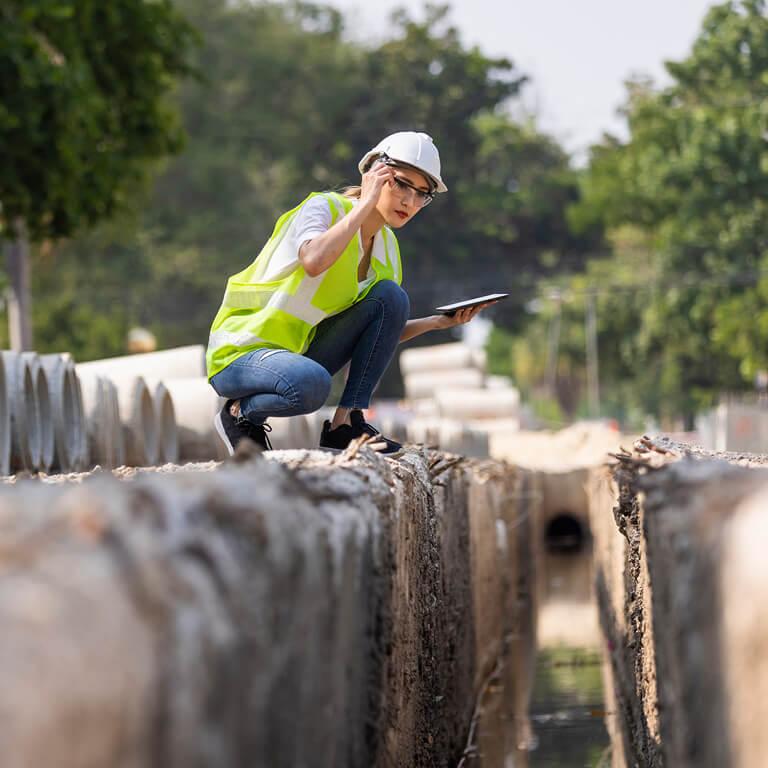
Award-winning graduates explain how civil engineering “has the power to transform the world”
In a time where headlines read that engineering is struggling to retain a talent pipeline, it’s refreshing to see a new generation of engineers being rewarded for their contributions to the profession.
Matchtech has been the proud sponsor of the Martin Roach Development Report Writing Competition, formerly known as the Transport for London (TfL) Graduate Awards, for several years.
Presented at an annual ceremony at the De Vere Grand Connaught Rooms in London on the 27 June, the awards celebrate the capabilities and achievements of graduate engineers on the TfL Civil Engineering Training Scheme and their ability to write excellent and interesting reports.
We caught up with this year’s three winners, Robert (Bobby) Bloch (first prize winner) who sadly was unable to attend the event, Konstantina Kouroupi (second prize) and Sam Cox (third prize), to find out about their reports and what winning the Martin Roach Competition means to them.
Explaining the work behind his award-winning report and what this recognition means to him, Bloch said:
“My professional development report covered my placement in power and cooling, acting as a civils discipline engineer. I provided civils support to the power and mechanical teams in the feasibility, concept and detailed stages of substation and ventilation design schemes. I was also able to carry out quality assurance on site during the handover stages. Many lessons were learned in the team which I will carry forward in my career.
“I am very proud; this award is a great achievement. The judges have put a lot of time and effort into the training programmes for developing engineers within TfL and to see that my report meets their standards for this award provides me with the confidence in my ability as an engineer. It also shows that I have developed my report writing skills to a level where I can apply for Chartership status. I am thankful to the many engineers who have aided me during my time on the TfL Graduate scheme.”
Kouroupi, who received second prize for her report on the Smart Mobility Living Lab (SMLL) project, explained:
“My report was formed around my experience with the SMLL, a world-leading project that will see the creation of a real-world urban testbed for developing Connected and Autonomous vehicles (CAVs) in the royal Borough of Greenwich and nearby Queen Elizabeth Olympic Park in Stratford. I got to lead on a project proposal for the Shared Research Programme which needed to be delivered under strict time constraints to external organisations such as BP, Honda, Aviva and Hastings Direct.
“One of my key contributions to the SMLL was preparing a full bid for a future trial. This was a new international client and I was fully responsible for owning the whole bid, following support from the business development team. This was a challenging task but in the end, I managed to put together a technical proposal that has ultimately won the first piece of work for SMLL.
“Being awarded second place in this year’s competition is a validation of the hard work that I put in. This award gives me added confidence to keep being passionate about everything I do and to pursue my Chartership with the ICE.”
Cox, who received third prize for his report, which focuses on his project at Ealing Common Depot, said:
“My report focuses on the work I was able to be involved in at Ealing Common Depot and, in some instances, be the lead on. The report covers problem-solving within the application of engineering principles, project management planning, project monitoring and reporting and construction management functions. This was an unbelievable opportunity and the prize is a testament to the outstanding work being done at Ealing Common Depot as part of 4 Lines Modernisation (4LM) – it’s a great pleasure to be acknowledged with this prestigious prize.”
Inspiring the next generation of engineers
Given the current drive for more young people to study STEM subjects, we asked the winners how they were inspired to pursue a career in engineering. Bloch said:
“I always enjoyed maths and physics at school and I wanted to do something practical rather than go into academic research. I was inspired to have a career where I could work on a wide variety of projects and learn the skills that would have a direct impact on the world – civil engineering seemed to be the best profession where I could do this.”
Kouroupi added:
“I spent much of my childhood watching my mother sitting at her drawing table, bringing ideas to life using a pencil and a piece of paper. I’d pass whole afternoons at our house, trying to produce replicas of her designs. My mother never tried to steer me toward an engineering career but her passion for engineering was infectious.
“Civil engineering continued to grow on me as I started to gain an understanding of the impact it has on people’s lives. From providing people with access to clean drinking water to building roads, bridges, railways and airports and delivering green infrastructure, civil engineers have the power to transform the world and I wanted to be a part of this.
“After two years with TfL, I could not be more grateful for the opportunities that I have been given to develop as an engineer and support the massive transport system that keeps London moving.”
Cox concluded:
“Ever since school, I have enjoyed learning how things work and how to fix things. This led me to the TfL Civil Engineering Graduate Scheme where I have been a part of the 4LM Ealing Common Depot project team to enable new District Line trains to be maintained at the depot. This has enabled me to play an active part in implementing an engineering design.”
Matchtech would like to wish this year’s Martin Roach Development Report Writing Competition winners very many congratulations.